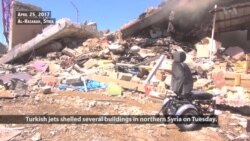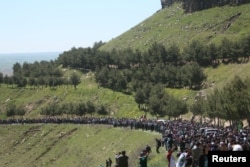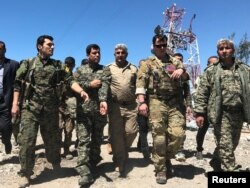Turkish warplanes on Tuesday targeted fighters from the outlawed Kurdistan Workers' Party, the PKK, as well as members of the YPG, a key Kurdish affiliate on the Iraqi-Syrian frontier, where Kurdish units play a key role in a loosely knit coalition battling Islamic State extremists.
Monitors from the Syrian Observatory for Human Rights, said Wednesday at least 28 people were killed in the strikes with around 20 others injured.
Turkey, the United States and the European Union have designated the PKK as a terrorist organization for its decades-long autonomy push against the Ankara government in Turkey's southeast. On Tuesday, the Turkish military defended the expanded airstrikes.
WATCH: Turkish Strike Leaves Syrian Kurdish Fighters Fuming
"To destroy these terror hubs, which threaten the security, unity and integrity of our country and our nation, and as part of our rights based on international law, airstrikes have been carried out," a short Turkish military statement read.
Sinjar Mountains
Witnesses said Turkey's target grid was expanded for the first time Tuesday to include the Sinjar Mountains, a territory in northern Iraq where another Kurdish militia with links to the PKK was also hit by the airstrikes. Turkey has described Sinjar as a Kurdish logistics hub where militants plan attacks inside Turkish territory.
"Turkey has launched many cross-border operations like this against the PKK in the [nearby] Qandil Mountains," said Semih Idiz, columnist for the Al Monitor website. "It has warned it will do the same against Sinjar, to prevent it falling to the PKK like Qandil. It is also a message to the domestic audience, saying Turkey's determination to fight the PKK continues just as before."
Other Turkish media were also awash with images of the airstrikes, invariably accompanied by nationalist music. But their military effectiveness is already in question, with retired Brigadier General Haldun Solmazturk saying "they were intended to reinforce verbal threats and warnings."
At the site of the attack, in the Syrian city of al-Hasakah not far from the Iraqi border, Kurdish fighters and local residents protested the Turkish raids.
Marwan Qamishlo, a member of the Kurdish militia known as the People's Protection Units (YPG), told VOA that the strikes hit a local radio station, a media center, several communication towers and some military posts, killing an undetermined number of fighters on Qarachogh Mountain.
"It was 2 a.m. when Turkish planes started shelling our media headquarters," Qamishlo said. "I don't know how many planes were there, but they were all over the sky. … Tens of bombs were dropped on us for about an hour and a half."
Communication complex
Kurdish fighters said the location was initially used to broadcast TV and radio programs to the Syrian Kurdish cities and some Yazidi areas on the Iraqi border. VOA footage taken hours after the airstrikes showed the complex in rubble.
Helicopters containing a contingent of U.S. military arrived at the site later Tuesday to assess the damage. U.S. commanders accompanied the YPG forces on a tour of the damage but refused to speak to reporters.
A YPG commander who requested anonymity told VOA that YPG leaders had come under a lot of pressure from Turkish airstrikes and told the Americans that they might not be able continue to fight IS in Raqqa if the U.S. was not going protect them and their families from future attacks.
As the U.S. contingent was preparing to leave the site, thousands of Kurdish protesters who were marching near the mountain approached them. They chanted slogans against Turkish President Recep Tayyip Erdoğan and demanded that the U.S.-led coalition act to halt the Turkish raids.
"I ask the coalition, which fights IS terrorism, to protect the Syrian Kurdistan that was built by the blood of our youth," a female protester shouted. "We removed IS from this land. We defeated all terrorist groups. We protected humanity against terrorism. Now the international community has the responsibility to protect us."
State Department spokesman Mark Toner said the U.S. expressed concern to the Turkish government about the airstrikes, saying they were conducted without proper coordination with the U.S.-led coalition battling Islamic State.
"We recognize their concerns about the PKK, but these kinds of actions, frankly, harm the coalition's efforts to go after ISIS, and frankly, harm our partners on the ground who are conducting that fight,” Toner said.
It remained unclear late Tuesday what, if any, impact the airstrikes will have on long-range U.S. efforts to coordinate an attack on the Islamic State stronghold at Raqqa with forces that include Kurdish fighters from several separate Kurdish factions.
One anti-jihadist faction, the Kurdish militia known as the People's Protection Units (YPG), makes up the backbone of a coalition backed by both the United States and Russia.
That coalition, a loosely knit alliance known as the Syrian Democratic Forces, is closing in on the Islamic State de facto capital of Raqqa in northern Syria, and analysts say a major anti-jihadist assault on the city is likely later this year.
VOA's Ahed Al Hendi and Rikar Hussein contributed to this report.











